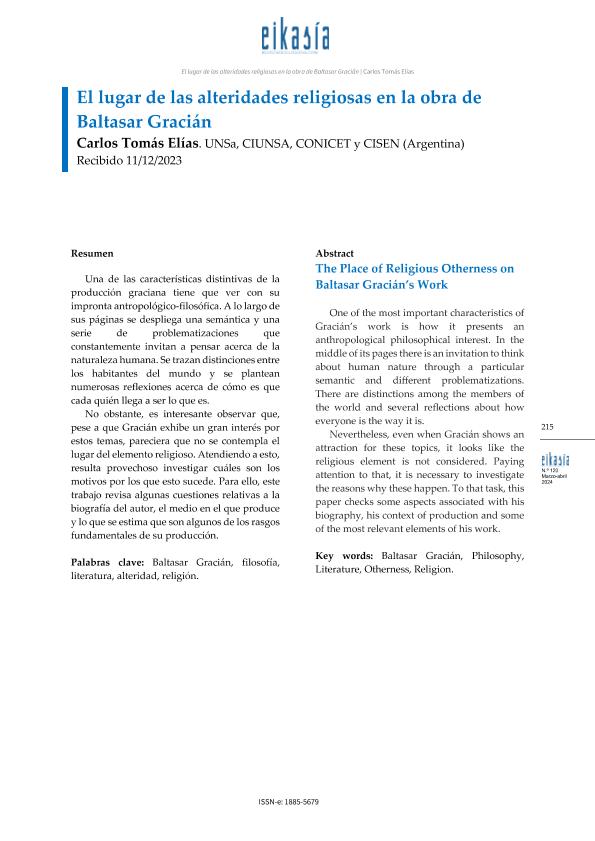Mostrar el registro sencillo del ítem
dc.contributor.author
Elías, Carlos Tomás

dc.date.available
2024-03-20T14:08:47Z
dc.date.issued
2024-03
dc.identifier.citation
Elías, Carlos Tomás; El lugar de las alteridades religiosas en la obra de Baltasar Gracián; Eikasía Ediciones; Eikasía; 120; 3-2024; 215-231
dc.identifier.issn
1885-5679
dc.identifier.uri
http://hdl.handle.net/11336/231062
dc.description.abstract
Una de las características distintivas de la producción graciana tiene que ver con su impronta antropológico-filosófica. A lo largo de sus páginas se despliega una semántica y una serie de problematizaciones que constantemente invitan a pensar acerca de la naturaleza humana. Se trazan distinciones entre los habitantes del mundo y se plantean numerosas reflexiones acerca de cómo es que cada quién llega a ser lo que es. No obstante, es interesante observar que, pese a que Gracián exhibe un gran interés por estos temas, pareciera que no se contempla el lugar del elemento religioso. Atendiendo a esto, resulta provechoso investigar cuáles son los motivos por los que esto sucede. Para ello, este trabajo revisa algunas cuestiones relativas a la biografía del autor, el medio en el que produce y lo que se estima que son algunos de los rasgos fundamentales de su producción.
dc.description.abstract
One of the most important characteristics of Gracián’s work is how it presents an anthropological philosophical interest. In the middle of its pages there is an invitation to think about human nature through a particular semantic and different problematizations. There are distinctions among the members of the world and several reflections about how everyone is the way it is. Nevertheless, even when Gracián shows an attraction for these topics, it looks like the religious element is not considered. Paying attention to that, it is necessary to investigate the reasons why these happen. To that task, this paper checks some aspects associated with his biography, his context of production and some of the most relevant elements of his work.
dc.format
application/pdf
dc.language.iso
spa
dc.publisher
Eikasía Ediciones
dc.rights
info:eu-repo/semantics/openAccess
dc.rights.uri
https://creativecommons.org/licenses/by-nc-nd/2.5/ar/
dc.subject
Baltasar Gracián
dc.subject
Literatura
dc.subject
Filosofía
dc.subject
Alteridad
dc.subject.classification
Otras Filosofía, Étnica y Religión

dc.subject.classification
Filosofía, Ética y Religión

dc.subject.classification
HUMANIDADES

dc.title
El lugar de las alteridades religiosas en la obra de Baltasar Gracián
dc.title
The Place of Religious Otherness on Baltasar Gracián’s Work
dc.type
info:eu-repo/semantics/article
dc.type
info:ar-repo/semantics/artículo
dc.type
info:eu-repo/semantics/publishedVersion
dc.date.updated
2024-03-19T13:59:43Z
dc.journal.number
120
dc.journal.pagination
215-231
dc.journal.pais
España

dc.journal.ciudad
Oviedo
dc.description.fil
Fil: Elías, Carlos Tomás. Universidad Nacional de Salta. Facultad de Humanidades; Argentina. Consejo Nacional de Investigaciones Científicas y Técnicas. Centro Científico Tecnológico Conicet - Salta; Argentina. Universidad Nacional de Salta. Facultad de Humanidades. Centro de Investigaciones Sociales y Educativas del Norte Argentino;
dc.journal.title
Eikasía
dc.relation.alternativeid
info:eu-repo/semantics/altIdentifier/doi/https://doi.org/10.57027/eikasia.120.849
dc.relation.alternativeid
info:eu-repo/semantics/altIdentifier/url/https://www.revistadefilosofia.org/index.php/ERF/article/view/849
Archivos asociados
